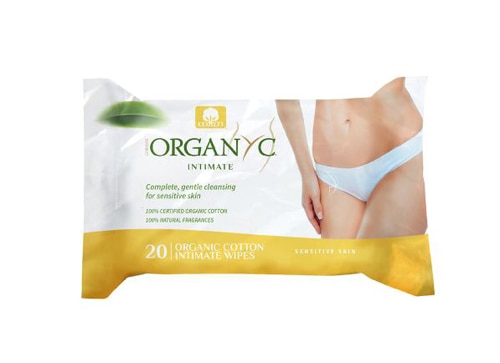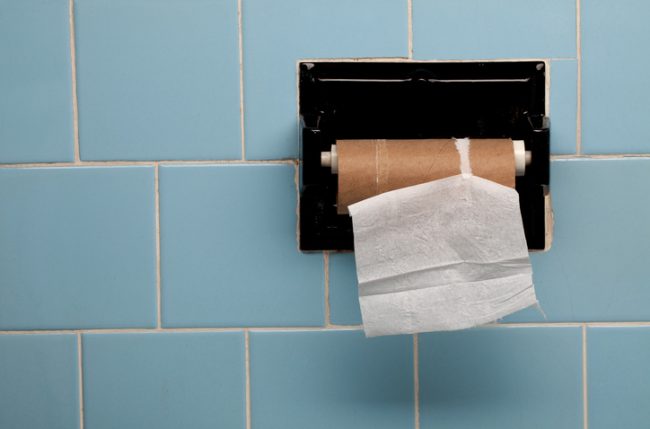The bathroom is a mecca for a trifecta of waste: excessive water use, a deluge of disposable trash and a toxic brew of chemical cleaners. We admit—it’s challenging to go zero waste in the bathroom. But it is entirely possible to make your bathroom significantly greener. Changing your habits, cutting back on convenience for the sake of the greater good, and choosing cleaner products will make your home—and the planet healthier. Here’s how.
1. Minimize the paper
Toilet paper seems to be a necessary evil in our culture, which even fetishizes the softness of the squares. Think about it—how soft does the toilet paper need to be to do its job well? Be sure to choose toilet paper made from recycled sources; it’s the bare minimum you can do.
You can also use a much more economical amount of toilet paper than you think you need: one square per visit is optimal, with two or three squares reserved for pesky occasions. Try folding the square over to get several wipes out of it.
Finally, the site treehugger recommends hanging the toilet roll so the sheets come over the top rather than under the top. Apparently roll over wastes less paper than roll under. Who knew?
2. Say sayonara to single use
There’s no denying the convenience of single-use wipes, disposable toilet brushes and even paper towels for cleaning. But they are truly a silly indulgence when it comes to measuring their entirely unnecessary carbon footprint. Stick to reusable rags or microfiber towels for mirrors, sinks, and cleaning. Similarly, opt for cleaners sold in refillable containers, so you can reuse that perfectly-good spray bottle, instead of buying a new one each time. In the same vein, plastic pump-action bottles of hand soap are extravagantly wasteful—instead buy hand soap in bulk that you transfer into your own soap dispenser.
3. Choose personal care products and cleaners wisely
Conventional personal care products and bathroom cleaners are filled with toxic chemicals. They not only can compromise your health, but also pollute both the air when inhaled and our waterways when rinsed down drains and flushed down toilets.
So read the labels of the personal care products you buy, referring to the Campaign for Safe Cosmetics list of chemicals of concern and the EWG Guide to Healthy Cleaning to help you figure out the hidden hazards of many ubiquitous ingredients. Keep on the lookout for personal care companies that opt for closed-loop production— a production process in which post-consumer waste is collected, recycled and used to make new products (often containers can be refilled or returned).
4. Get water-savvy
The most effective way to green your bathroom is to conserve water. According to the EPA, showering is one of the leading ways we use water in the home, accounting for nearly 17 percent of residential indoor water use—for the average family, that adds up to nearly 40 gallons per day. For perspective, the amount of water used per day by the rest of the world is 2.5 gallons.
And flushing is another way we squander water: If your toilet is over 21 years old, consider replacing it with a low flow model. In 1994, the National Energy Policy Act mandated that all new toilets sold in the United States use 1.6 gallons of water or less per flush—older toilets may use anywhere from three to seven gallons per flush. (Remember the old adage if it’s yellow let it mellow? You really don’t need to flush every time.) Low flow shower heads, faucets, faucet accessories and toilets are practically no-brainers and in many areas, utilities offer rebates and vouchers that can lower the price.
5. Opt for all natural fabrics
When it comes time to dry off, choose towels made from sustainable materials such as organic cotton and bamboo. Conventional cotton is a pesticide magnet, considered by many to be the world’s dirtiest crop. According to the World Wildlife Fund, “Worldwide, cotton covers 2.5% of the cultivated land and cotton growers use 16% of the world’s pesticides.” Or opt for super soft and breathable towels made from bamboo, a fast-growing sustainable alternative to cotton.
If your shower has a curtain, avoid ones made from polyvinyl chloride (PVC) plastic. PVC production is a nasty business, creating a bevy of highly toxic compounds that continues to off-gas in your home. Plus PVC can't be recycled—instead it leaches chemicals that eventually make their way back into our water system. Consider replacing your shower curtain with one made from hemp, a fabric known for being naturally mold-resistant.
Editor’s note: While you’re thinking about greening your powder room products, you may want to consider swapping conventional bathroom cleaners for eco-friendly ones. Check out our Zero Hunger, Zero Waste initiative for more information.




